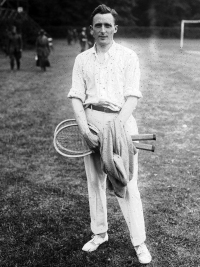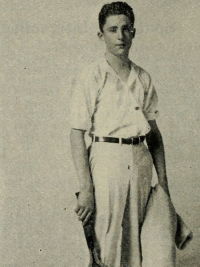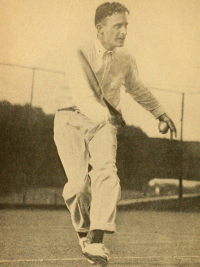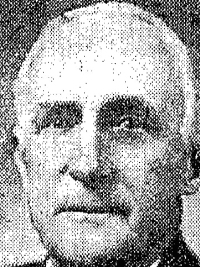Dean Mathey
| Born |
Subscribe now
This information and data is not available because you are not our subscriber yet.
Please click here and get full access to the entire database! |
|---|---|
| Died | |
| Plays | |
| Bio | He was an American tennis player active in the early 20th century. Namesake of Mathey College at Princeton University he was raised in Cranford, New Jersey and was a member of the Cranford Golf Club (now called the Echo Lake Country Club. He won the National Clay Court Tennis Doubles Championship twice. Mathey reached the quarterfinals of the U.S. National Championships in 1910 and the final of the doubles in 1914. Dean Mathey, who served as a trustee under Presidents Hibben, Dodds, and Goheen, was one of the most devoted, energetic, and generous supporters of the University in modern times. His association with Princeton covered a period of sixty-five years and included a wide acquaintance among trustees, faculty, and alumni. He first came to Princeton in 1907 to play in the University's annual interscholastic tennis tournament, which he won. In his book of Princeton reminiscences, Men and Gothic Towers, he recalled the "lovely starlit early May evening'' when, as an overnight guest of an upperclassman in Blair Hall, he heard the seniors singing on the steps of Nassau Hall, and was stirred by the program, "a medley of sentiment, humor, loyalty to Alma Mater and the nation.'' He was also inspired by the beauty of the Gothic buildings, by "Blair Arch with its spectacular steps, the clock in the tower.'' The next summer, in 1908, he won the national interscholastic tennis championship at Newport, Rhode Island, and that fall he entered Princeton. He twice won the national intercollegiate doubles championship -- in 1910 with a classmate, Burnham N. Dell; in 1911 with another classmate, Charles T. Butler -- and was captain of the University tennis team in his senior year. He was elected to Phi Beta Kappa and graduated with honours. He also "had the good fortune'' to hear Woodrow Wilson lecture in his popular course in jurisprudence a short time before Wilson left Princeton to run for governor of New Jersey in the fall of 1910, and was Wilson's great admirer, "as was the entire student body.'' In 1912, he cast his first presidential vote for Wilson and for many years thereafter liked to identify himself as a "Woodrow Wilson Democrat,'' which, to his amusement, perplexed some of his Republican associates on Wall Street. Later, as a trustee, he headed the campaign that raised funds for an increased endowment for the School of Public and International Affairs as a memorial to Wilson. On graduation (1912), Mathey started to work as a bond salesman, at $15 a week, for William A. Read & Co. and eventually became a partner of its successor, Dillon, Read & Co. He found Wall Street a satisfying outlet for his competitive spirit and gradually built up a sizable fortune. He came to live in Princeton in 1927 in an old farmhouse that he had remodeled with the help of his architect classmate Arthur Holden, on property he had bought from the estate of Moses Taylor Pyne. Here he gave luncheons for classmates on Reunion Saturdays and for University trustees and officers on Baccalaureate Sundays and entertained University guests when need arose. He was alumni trustee of the University from 1927 to 1931, charter trustee from 1931 to 1960, trustee emeritus from 1960 until his death; he served at various times on every one of the board's nine standing committees. His twelve years as chairman of the finance committee, 1949 to 1960, and of its subcommittee on investments, were marked by a six-fold increase in the University's budget and a doubling in value of its investment pool. He was fond of saying, if asked about some attractive investment his committee may have overlooked, `"Well, you can't kiss all the pretty girls,'' but, as one of his associates said, "Mathey didn't miss many of them.'' His greatest love was the committee on grounds and buildings, on which he served for thirty-four years and of which he was chairman from 1942 to 1949. "He gave countless hours to every phase of the committee's work,'' President Goheen said, "from the smallest details to the largest matters of policy, with unfailing concern for the preservation of the beauty and, in his words, `the human feel' of the Princeton campus.'' Mathey's love of architectural niceties, his affection for his family and friends, and his regard for the traditions of the place can be seen here and there across the campus. He conceived of the Henry B. Thompson Memorial Court within the East Pyne Building. With Mrs. Harold W. Dodds, he planned the garden in memory of President Hibben and the bench in memory of Beatrix Farrand on the north side of the chapel. He gave the Dean Samuel Winans wall enclosing the rear garden of the John Maclean House, in memory of his father-in-law, and the Gertrude Winans Mathey faculty housing near the Graduate College, in memory of his first wife. He proposed, and with another Princeton tennis captain, Joseph L. Werner '21, was co-donor of the pavilion between the rows of tennis courts on Brokaw Field. When his classmate Sanford B. White, a legendary athlete of their college days, died in 1964, Mathey led the Class of 1912 in providing in White's memory another pavilion, which stands in the midst of the Bedford, Gulick, and Pardee playing fields. In 1933 he served on the committee appointed to wait on Harold W. Dodds to notify him of his election as president, and in 1957 on the committee that recommended Robert F. Goheen's election as president. Mathey held that the trustees of a university cannot delegate their responsibilities but that they can and should delegate to the president the authority vested in them by charter. "They should choose . . . the best educator . . . they can find,'' he wrote, "and [then], though there may be differences between members of the board and even the whole board of trustees about minor policies from time to time, they should back up their president in his over-all educational policies and [defend him] from the heckling of chronic alumni gripers who think the old place is going to the dogs.'' As a trustee Mathey practiced what he preached, supporting the University with an open-minded concern and a large generosity. "Perhaps his most consistently felt -- and generously shown -- interest [President Goheen wrote] was the development of faculty housing. . . . How much he did by generous gift, as well as by wise judgment, in this area of the University's needs, is little known, for he preferred not to take the credit; but I can tell you it was very large. "And this is a clue to the personality of Dean Mathey -- so cheerful and outspoken in everything -- and all the while modestly concealing his own role. The full extent of his many gracious and generous thoughts and acts on behalf of Princeton and Princetonians was probably not fully understood by anyone -- perhaps not even by himself. "Financier he was, overseer of buildings and grounds he was, but he always placed the human concern ahead of all others. Liveliness and warmth went with keen intelligence and shrewd judgment. Dean liked people.'' Mathey never revealed to anyone the extent of his benefactions to the University, but he did disclose the philosophy behind them in an essay he wrote for the Class of 1912's Fifty Year Record: "Why do we, along with the alumni . . . of our sister colleges, return to our campuses with a certain solemnity -- even though it be on joyous occasions such as a reunion or a traditional football game?'' he asked his classmates. "And why do so many of us so often lay so much of our treasure at our Alma Mater's feet?'' "I believe the causes of this loyalty to our private colleges [he wrote] . . . go back to the first law of nature, namely survival. For, it seems to me we sense how fleeting all things are, not only the things we build with our hands, but life itself and even our posterity. And along with this we also sense, subconsciously perhaps, that the great seats of learning . . . some established as far back as the eleventh century -- have withstood the ravages of time better than any other thing to which we ourselves may contribute.'' Source:Alexander Leitch (Princeton University) |
| Misc | Subscribe now |
| Tournament | AO | RG | W | US | Win-Loss |
|---|---|---|---|---|---|
|
Subscribe now
This information and data is not available because you are not our subscriber yet.
Please click here and get full access to the entire database! |
|||||



